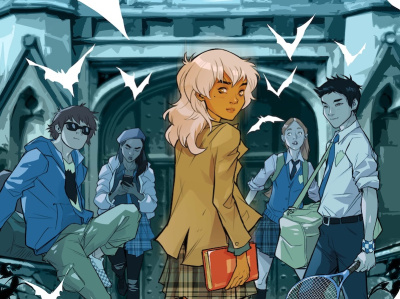
A few weeks ago at the San Diego Comic-Con, we sat down with DC President and Publisher Paul Levitz for our annual talk about the state of the comic business and DC's place in it. In Part Three, we talk about the status of DC’s relationship with Flex, the Zuda Web comic site, film plans and
Can you update us on what’s going on with Flex?
We’ve succeeded in bringing over the first couple of titles into print, and there should be a good pipeline following it. We found it an interesting experience and are trying to use it to learn about the intricacies of Japanese creative process for manga—it’s a good window on that world. We still haven’t perfected all the different experiments in digital distribution that we’d like to do. We’ve got a few things coming on the pipeline to use the digital distribution effectively for promotion of titles. I don’t think much has been announced at this stage.
What are you learning from the Flex process to use on your other projects?
Starting to use them on Flex per se, our ability to use them on other things we do will, I think, come in almost a metaphoric sense. Because we have a different set of rights than we usually have on manga that we’d usually just have reprint rights to. And things that work with manga won’t necessarily work the same way with regard to American comics.
Speaking of digital distribution, any reflections on Zuda a year in?
The numbers seem to keep going up, which is exciting in terms of the readership that is showing up. We’ve tapped into a bunch of wonderful, young creative talents. I met one of the artists here who was from
You’re seeing more and more publishers experiment in the world of Webcomics, trying to figure the way to fit together. I haven’t gone online yet to see the new Top Shelf 2.0 stuff...
There are three publishers that launched sites this week...
The screen is a powerful method of delivery for a younger generation and it’s going to be part of our business one way or another, hopefully in a very complementary fashion. I think we start doing print stuff on Zuda in early ‘09 in the current schedule. And that will be an interesting test to see how that translates over.
You said traffic numbers are up. Can you talk more about those numbers?
I don’t even remember them in specific detail, all I know is when I look at the pattern, it keeps moving in the right direction.
There was a whole kerfluffle in the Hollywood trades about DC and its filmed entertainment properties—rumors of a series of meeting to reconsider strategy and an announcement from Warner Brothers that said, “we’re always looking at our options,” but here we are two weeks later with Dark Knight a big hit and the rumors dying down. What are your thoughts on how DC’s path to screen has been working and should we expect changes?
The process of making a great comic book film has always been a long and torturous one. Our batting average is pretty damned good. It certainly looks a lot better this week than it did the week before. We’ll stand by our average, but we’ll keep looking for new ways to make it better.
That ties into the last question, which puts it in context of this location for our interview—
I think you’ve got to separate out comics from superhero films; they’re two very different questions. The good news about superhero films is there are only two really great oil wells. It’s kind of like the situation that exists in manga. At the end of the day, Viz and Kodansha have inherent structural competitive advantages in publishing manga because the parent companies create and own the best libraries. There are some great properties with other people, you can compete for those, but they have the deepest, the broadest, the richest oil well. When you want to go make a superhero movie, the two great oil fields are DC and Marvel and assuming those are well managed, you should have a good flow, but not an insane, excessive flow. And every time people triy to do “my generic superhero” film, they tend to be unhappy at the end of it.
Hancock?
I don’t think Hancock is a generic superhero film. You start out with Will Smith, who’s an extraordinary talent, probably as successful a box office star as there is today, and you start out with a tonality that is at least a step removed from the average superhero film. I don’t think we overdose easily on superhero films, assuming that the two major oil wells are managed properly.
Comics have an even lesser problem. I think what happened there is that







